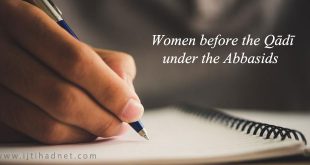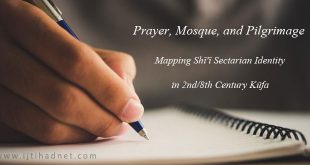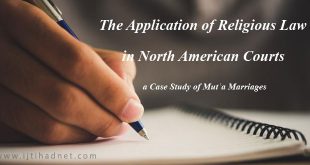In this article, the writer examines the appearance of Muslim women before the judge during the Abbasid period (132-334/750-945), both in theory and practice...
Read More »New Book Release: Islamic Laws of Food & Drink according to the Ayatollah Sistani’s Rulings
This booklet provides valuable Islamic guidance that covers every aspect of eating and drinking– important ethical considerations and a description of various types of foods, their qualities, and the....
Read More »Prayer, Mosque, and Pilgrimage: Mapping Shī’ī Sectarian Identity in 2nd/8th Century Kūfa
Most studies on the emergence of Shīʿism privilege the role of theology and emphasize the importance of rival historical claims regarding Muḥam mad’s succession....
Read More »The Link between Islamic Law and Hydrocarbon Agreements
This article sets out to make clear the connection between Islamic law and hydrocarbon concessions, and provides a brief summary of the religion and its bearing on hydrocarbon...
Read More »Was al-Shafiʻi the Master Architect of Islamic Jurisprudence?
During the last three or four decades, modern scholarship has increasingly come to recognize Muhammad Ibn Idris al-Shafiʻi (d. 820) as having played a most central role in the early development of...
Read More »Article: Islamic Law and Environmental Ethics
The article titled, Islamic Law and Environmental Ethics: How Jurisprudence (usul al-fiqh) Mobilizes Practical Reform, shows how those principles can function as mechanisms for normative change, and reviews their diagnostic capacity for evaluating various uses of...
Read More »Article: Conceptualizing Shari‘a in the Modern State
This Article addresses the animated and evolving role that Shari'a, and Shari'a conceptions play in the contemporary world. There are various manifestations of this evolving role in the often dynamic, subtle, highly negotiated, and far from formalistic ways that Shari'a is animated in today's world...
Read More »The Application of Religious Law in North American Courts: a Case Study of Mutʿa Marriages
This comparative study examines the legal requirements for marriage in Islam as well as the legal requirements for mutʿa within Shiʿi traditions...
Read More »Are Those Who Their Mother or Grandmother Is ‘Sayyida’ Considered as Sadat?
Regarding to the great honor of the Holy Prophet's descendant (pbuh) among the believers and the importance of observing Islamic laws related to...
Read More »Two Shi‘i Jurisprudential Methodologies to Address Medical and Bioethical Challenges
The legal-ethical dynamism in Islamic law which allows it to respond to the challenges of modernity is said to reside in the institution of ijtihād (independent legal thinking and hermeneutics). However, jurists like Mohsen Kadivar and Ayatollah Faḍlalla have argued that the “traditional ijtihād” paradigm has reached its limits of …
Read More » Ijtihad Network Being Wise and Faithful Muslim in the Contemporary World
Ijtihad Network Being Wise and Faithful Muslim in the Contemporary World









